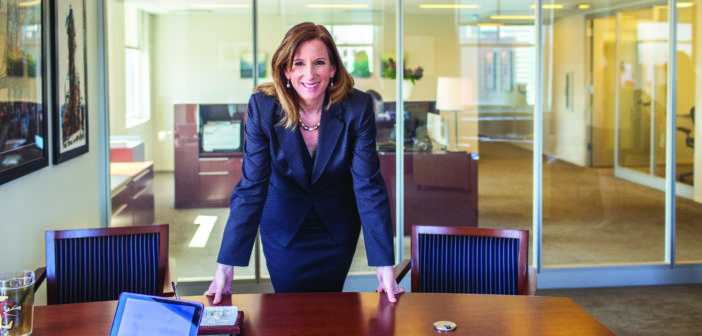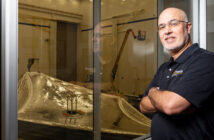Cathy Engelbert, ’86, the CEO of Deloitte and one of Fortune’s Most Powerful Women, will serve as the class of 2018’s commencement speaker. Engelbert spoke with The Brown and White about the takeaways of her Lehigh experience and the significance of authentic leadership.
Q: How does it feel to be a Lehigh alumna speaking at the university’s 150th commencement?
Cathy Engelbert: I never thought — when I graduated from Lehigh in 1986, when I went to Lehigh in 1982 — I never thought in my wildest dreams I’d be standing up in front of the class of 2018 and delivering a commencement speech. So I’m very, very excited, and I’m very hopeful that I can inspire the graduating class of 2018.
Q: How has Lehigh affected your career and all of your success? Have there been moments where you’ve looked back and thanked Lehigh for something it taught you?
CE: Oh, absolutely. One of the most interesting things was when I was interviewing, coming out of Lehigh, for full-time employment, and I’ll never forget… one of the people that interviewed me said, “Lehigh just really, really produces really well-rounded individuals” — not only academically but socially, athletically for me because I played two sports at Lehigh. So I always felt Lehigh brought me out of my shell. I was pretty shy when I got to Lehigh in 1982. I think playing athletics gave me confidence, and Lehigh taught me how to be a leader. And I didn’t realize it was teaching me to be a leader until years later, but it really was. I look back, I give Lehigh a lot of credit for molding me into the leader I am today.
Q: Speaking of that, you are now the CEO of a company that employs many Lehigh graduates. What kind of advice do you have for them — and all of this year’s graduates — about starting their careers?
CE: Because of the exponential pace of change in the world today, even though you’re graduating with your degree — and obviously lots of different degrees, whether it’s engineering or business or arts and sciences or other sciences, STEM degrees — you can never graduate. You always have to be learning. Lifelong learning becomes an important part of who all of those graduates that will graduate this year are. Because of the exponential change, we’re all going to have to change our skills. The half-life of skills is only two and a half years now, I think — it used to be five, probably was 10 or maybe 15 when I came out of Lehigh 32 years ago. And so, really, it’s just an amazing time, I think, for these graduates to come into the working world, but I also think things are changing so fast. So my advice is, keep learning, keep upskilling, keep essentially wanting to build your capabilities more broadly, because I think the world is going to need this generation in order to really solve some complex problems that are out in the world today.
Q: What is it like to be a female leader in a male-dominated field? Did you feel your Lehigh education set you up to face that challenge?
CE: That’s another thing I give Lehigh — probably a little bit of my upbringing. So I’m from a very big family, where both my parents worked but I was one of eight kids, and I had five brothers. So growing up, I’d kind of call it a male-dominated world. And obviously playing sports. Going to Lehigh — Lehigh at the time, and I know it’s very different now, was four males to one female. When I got to Lehigh, it was kind of like being at home with five brothers — lots of men. I remember my freshman English class, I was one of the only women, if not the only one. I think Lehigh did a nice job, though of, over time… of attracting both men and women from the high school ranks into Lehigh, I think maybe 50-50 now. But it wasn’t like that when I was there. So I think Lehigh prepared me very well to join a male-dominated world, that I’m optimistic is changing as more and more women take on key roles in companies, including myself. So I think the key is always that you find the right role models and sponsors for your career. I was fortunate to have sponsors, including one that was a Lehigh grad, who took me under their wing and helped me think about the different things that I could do, coming out of Lehigh.
Q: What qualities do you think make you successful? How do you manage power and leadership?
CE: I think one of the biggest qualities that especially millennials and digital natives… look for maybe (more) than my generation looked for when we joined the workforce was an authentic leader. I think you can spot authenticity from a mile away. Or if you’re not authentic, you can, more importantly, spot that. So I think authentic leadership, collaborative leadership — I think in today’s environment, there’s so much complexity around how to invest in things like artificial intelligence and social and mobile and the Internet of Things and blockchain and VR and AR — the whole data, digital and the disruption that’s going on — that you have to be a collaborative leader. No one person can lead a company of any size by themselves. We have 90,000 people that I’m in charge of every day, and you need to be a collaborative leader. I always say, you also need to be able to listen really well, and listen with the intent to understand, not the intent to respond. Because all too often, we listen and we’re trying to respond and make ourselves look smart, but I’ve learned as a leader that you actually get a lot of power in listening. You said, how do you use your power? — you use it by listening to all viewpoints. One of the things at Deloitte we’re very proud of is the diversity and inclusion platform. And that’s very important to me — not only as a woman leader — but to make sure women and men collaborate across our team to come up with the best solutions for our clients’ complex business problems. So I would say authentic leadership, collaborative and a listener. And use your voice when it’s appropriate. You don’t have to use your voice all the time, but use it when it’s really something you have passion behind. That’s how you use your power, when you have real passion for an issue.
Q: On top of being named one of the Most Powerful Women by Fortune, you were recognized by Working Mothers magazine as one of the Most Powerful Moms of 2017. What advice do you have for young women who might see a crossroads between advancing their career and starting a family? What advice do you have about balancing both?
CE: I think for working moms, and really women in general, there’s this myth that we’re supposed to strive to achieve “having it all” — and that “having it all” is defined by other people. It’s really a myth… It is something that I’ve always really thought about: how can I do it all with a family and career? And I decided that I can’t have someone else define it, I would have to define it myself. So that’s the first step I would recommend to women: define what doing it all, not having it all — because that’s someone else’s definition — but doing it all, means to you. Your career and your personal life are not linear. It’s not always going to be the same. I always tell people, when my kids were toddlers and adolescents, they needed me more. I would come in the door and they would cling to my leg. And now they’re teenagers, they don’t even look at me when I walk in the door. So it’s not linear, it changes. Even your career is never linear. You might have times when you fail in a job. But failure’s not final. I actually saw a quote the other day that success is not final and failure is not fatal. And I love that — just because you’re successful doesn’t mean you stop, and if you fail doesn’t mean you’re done. I think that’s really important to always remember, no matter whether you’re balancing work and family. Everybody calls it ‘work-life balance,’ and we should really shift it to ‘work-life integration,’ because if you think that you can get balance all of the time, 100 percent of the time, 365 days a year, you’re going to fail. And then you’re going to feel frustrated. So to the extent you can integrate your work and life, the extent you can build flexibility and predictability into your day… You have to find your spots to really balance it and make sure that you’re integrating everything.
Q: Is there anything Lehigh didn’t prepare you for? What do you wish you had known when you graduated that you want to impart upon this year’s graduates?
CE: I think the complexity of the business environment that has evolved. In 1986 there were no smartphones, there were no laptops, there were no iPads — there was no digital anything. And the internet hadn’t even been really discovered yet. I went to Lehigh at a time where there was programming and coding — actually, I started, I thought I wanted to be a computer science major. I started in that major and realized business was a better fit for me, thankfully, and I had Lehigh mentors that helped me see the way there. But the complexity of the environment that we’re working in over the past, I would say five years, to the exponential change around digital and around emerging technologies and quantum computing. Now, Lehigh has this integrated business and engineering degree — I think that’s fabulous, not every school has that. I’m kind of jealous that I didn’t have that opportunity back when I was at Lehigh, because you wouldn’t have thought you needed it back then, obviously. But if you had a crystal ball, maybe you would have known, but Lehigh was I think pretty smart to put that kind of thing in because everybody needs to be tech-savvy today. You don’t need to be tech-fluent — not everyone needs to be STEM, not everyone needs to be an engineer — but everyone needs to be tech-savvy in any job, because of the whole data, digital and disruption that’s going on in the world.






Comment policy
Comments posted to The Brown and White website are reviewed by a moderator before being approved. Incendiary speech or harassing language, including comments targeted at individuals, may be deemed unacceptable and not published. Spam and other soliciting will also be declined.
The Brown and White also reserves the right to not publish entirely anonymous comments.